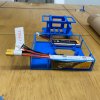After the post-mortem from the previous competition, we started by identifying the small problems that we had to fix before integrating the whole system. There were multiple issues being handled both from the hardware and the software perspectives. First, the main chassis that will hold the micro...
In order to see the goals taped with the retro-reflective tape, we attached our robot with an IR LED and take a picture of the frame. Then, we take a picture with the LED off. By setting a specific threshold, we can find pixel with the difference between the 2 images being more than the specified re...
Previously, a P controller was used for simplicity as it removes the requirement of keeping track of time at each time step. However, with the unstable motion of the blimp, a PID controller is needed to further stabilize the system. This is the result: The parameters were tuned based on the trac...
In the past 2 weeks, I tried to develop and algorithm that can be used if we have a blimp that have a camera facing down. With the camera, we would be able to detect the field of interest and control the robots within the field. In this case, the current algorithm can be used to control any vehicle...
Last week, the engineering effort was focused on setting up the hardware and building the blimp and any other required electronic components. Initially, we couldn't set it up using the balloon that we bought from Amazon, so we had to reuse the blimp that was used in the previous tournament. Due to t...
First, the camera detected all the blobs of within the camera frame. The color along with its horizontal and vertical position are encoded into a 7-character string, which is then sent to the feather board using the i2c protocol. the feather board iterates through list of string. If the color code m...
- «
- »
